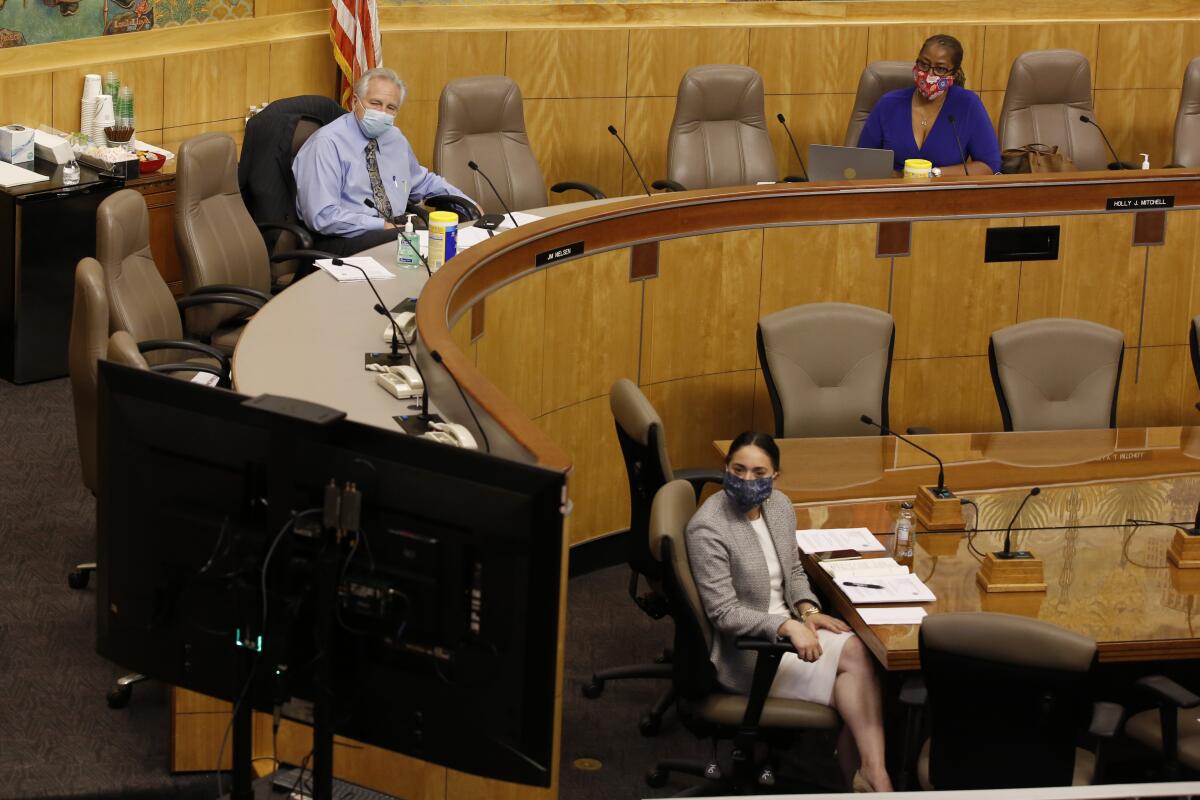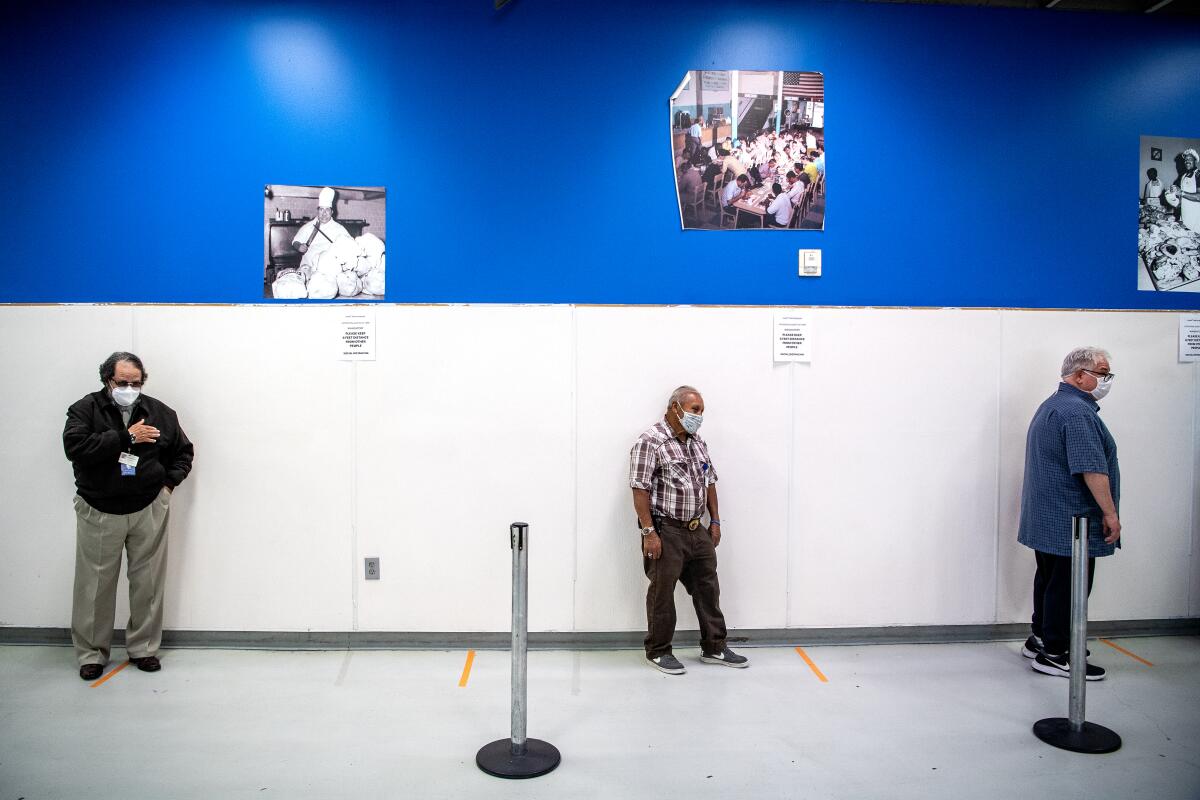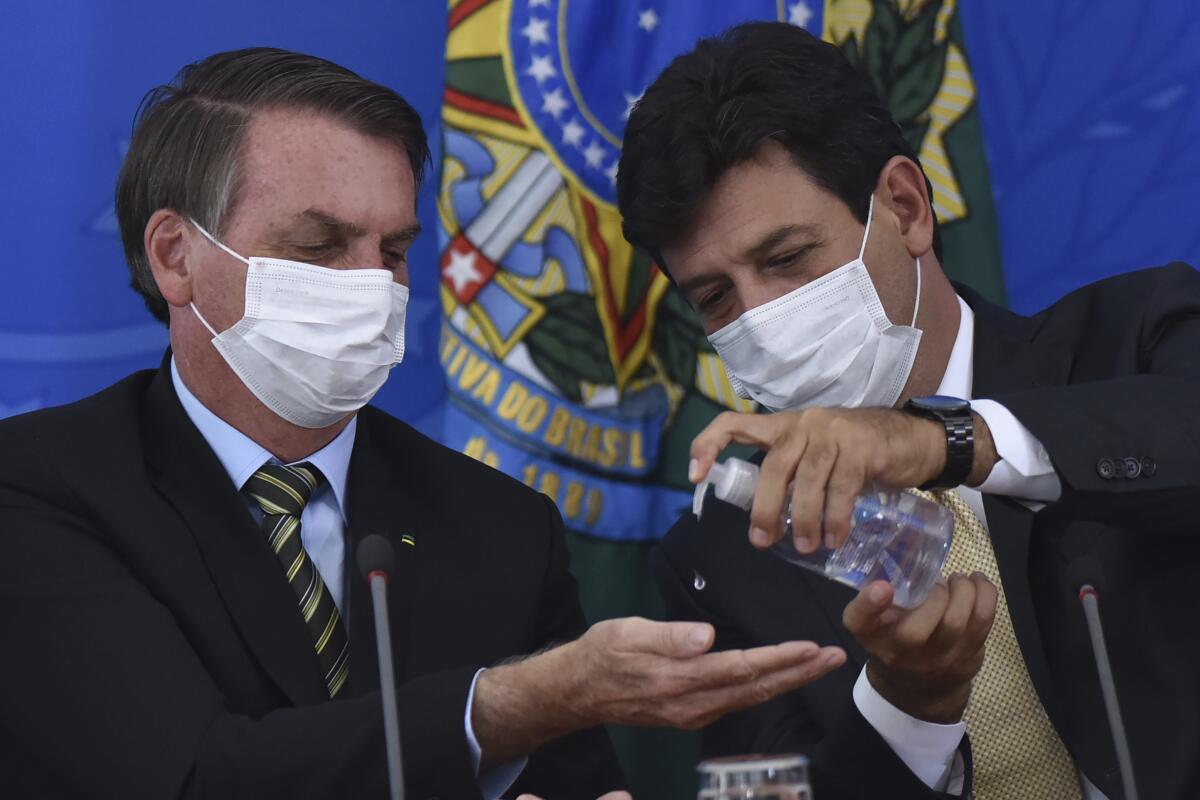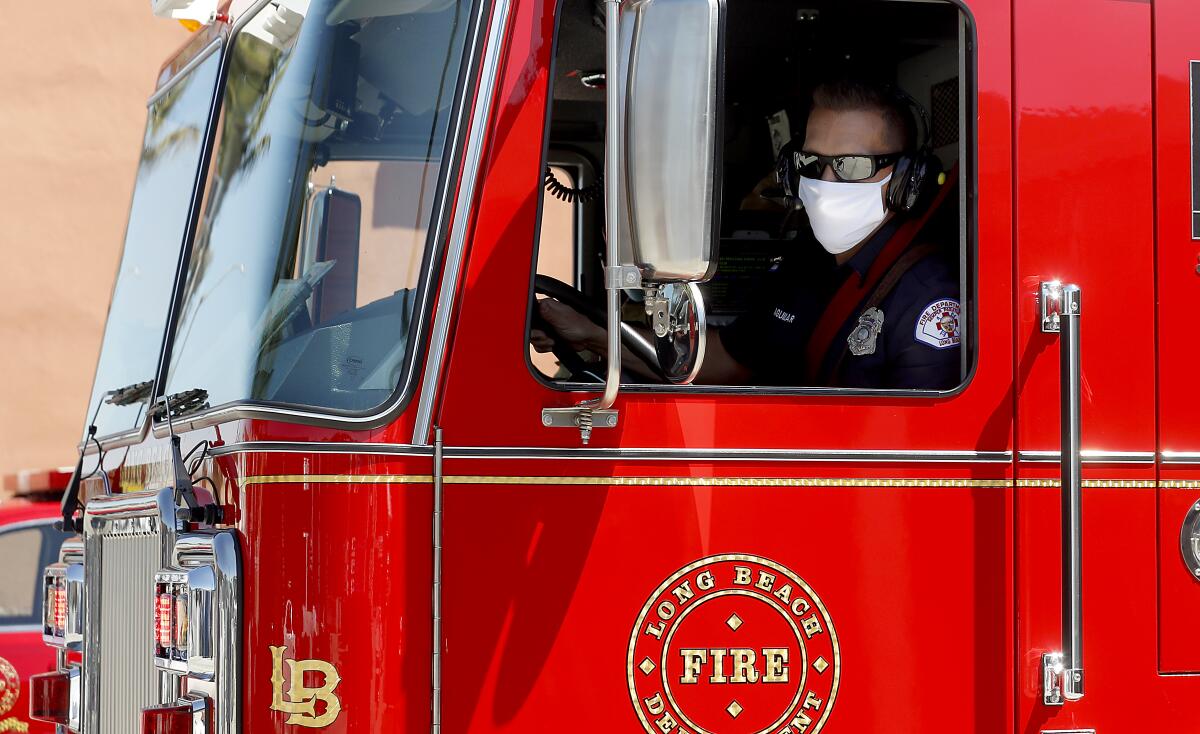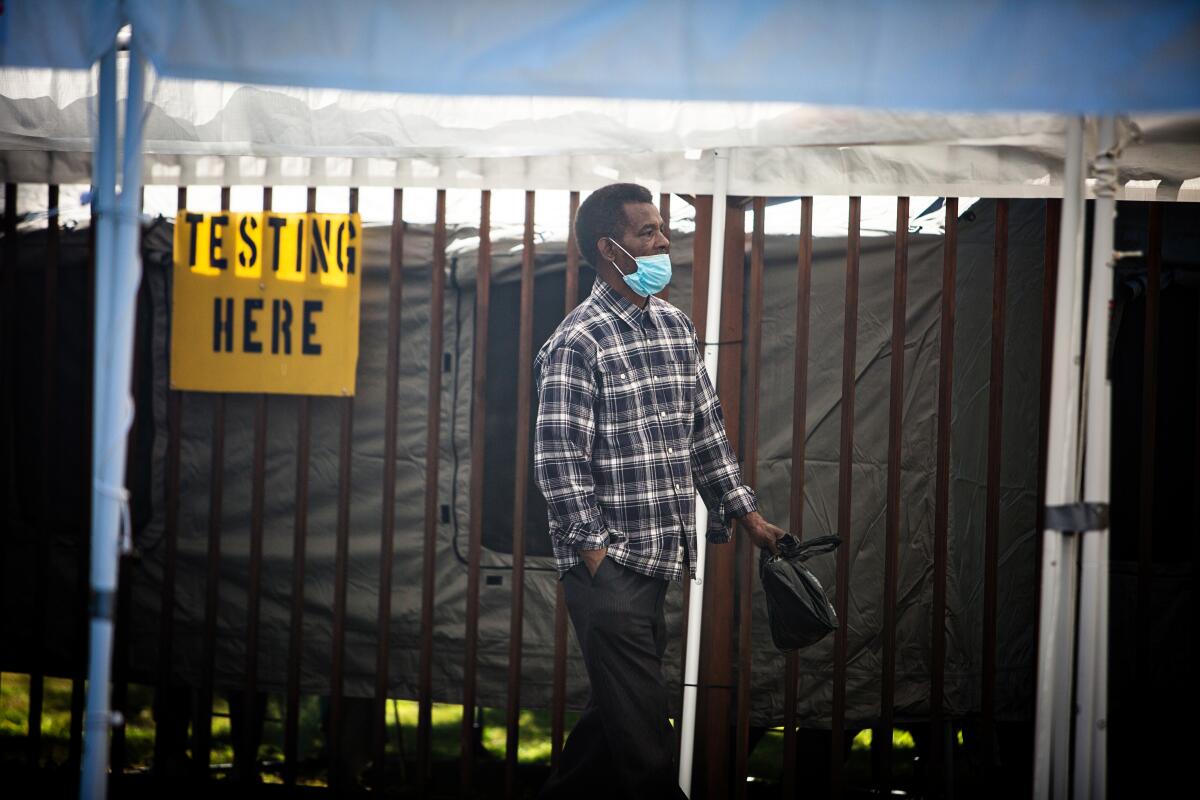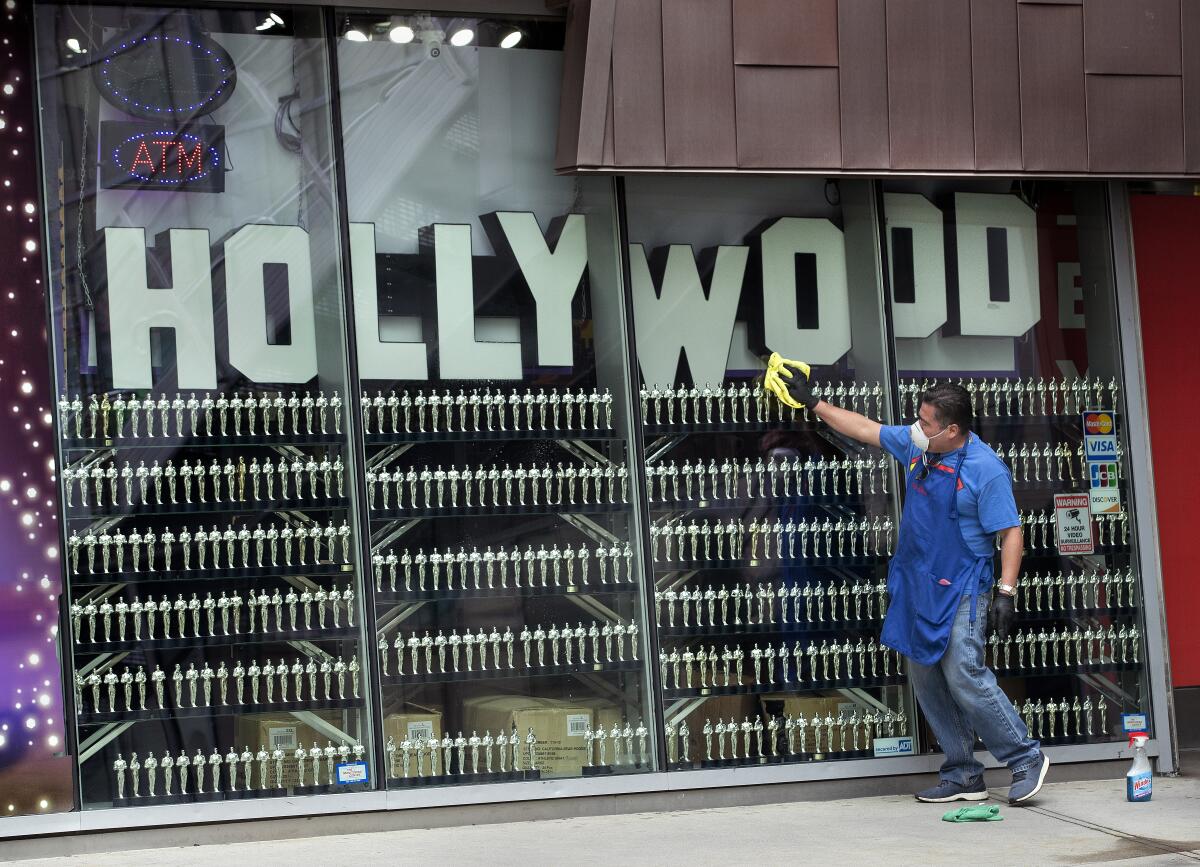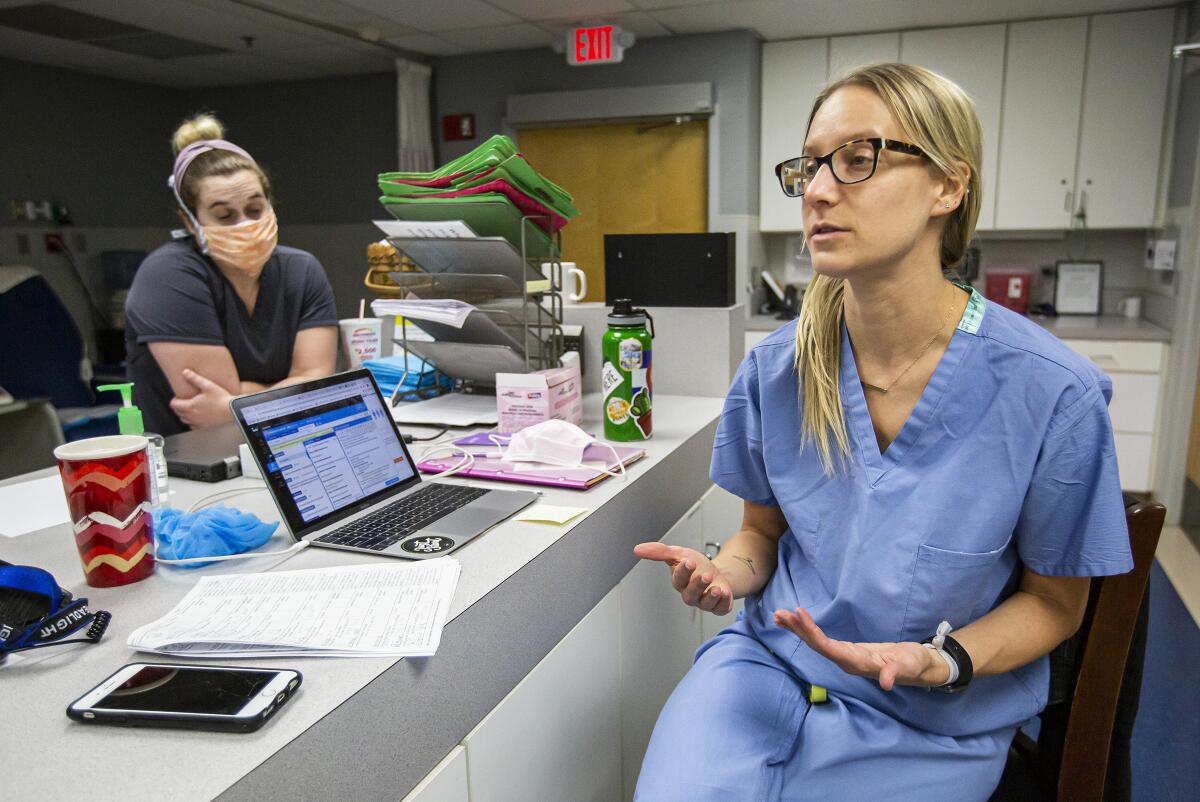The Los Angeles Times will provide around-the-clock updates on COVID-19 from across Southern California and around the world.
- Tracking the coronavirus in California: latest numbers | Support our journalism with a subscription
- Have a question about coronavirus? Send us your questions here. | You also can sign up for our newsletter
- See latest photo gallery
Coronavirus updates for April 15 are here
Wuhan, the original epicenter, ups its official death toll
BEIJING — The central Chinese city of Wuhan has raised its number of COVID-19 fatalities by 1,290, with state media saying Friday that the under-count had been due to the insufficient admission capabilities at overwhelmed medical facilities at the peak of the outbreak.
Wuhan’s revised death toll of 3,869 is the most in China. Numbers of total cases in the city of 11 million were also raised by 325 to 50,333, accounting for about two-thirds of China’s total 82,367 announced cases.
The official Xinhua News Agency quoted an unidentified official with Wuhan’s epidemic and prevention and control headquarters as saying that during the early stages of the outbreak, “due to the insufficiency in admission and treatment capability, a few medical institutions failed to connect with the disease prevention and control system in time, while hospitals were overloaded and medics were overwhelmed with patients.
“As a result, belated, missed and mistaken reporting occurred,” the official was quoted as saying.
New death cases were added because non-hospitalized deaths had not been registered at the disease control information system and some confirmed cases had been reported late or not been reported at all by some medical institutions, the official said.
San Diego airport declares local emergency as passenger traffic dives 96%
SAN DIEGO — Following the lead of other local agencies, the San Diego airport board Thursday declared a local emergency in response to the COVID-19 pandemic that has caused passenger traffic to plunge more than 90%.
While San Diego International Airport remains open for business, it is largely empty, with hundreds of canceled daily flights, no lines for security screenings, and most food and beverage concessions closed. As airport officials grapple with steep declines in what are normally robust revenues, they are having to sharply cut expenses and weigh whether to delay major capital improvement projects such as the $3-billion plan to expand Terminal 1.
“As you know, the COVID-19 has had a tremendous impact on the aviation industry,” said San Diego Regional Airport Authority Chief Executive Kim Becker. Passenger traffic has been greatly reduced nationally “and at our own airport is down 96% from the same week last year.... Because so much of the Airport Authority’s revenue depends on passengers flying, this has obviously had a significant effect on revenues.”
With the emergency declaration, the airport CEO will have the authority to take necessary measures to not only provide for the safety of the public and airport employees but to also secure needed supplies and alter already approved contracts.
Airport officials said Thursday they are still moving forward with the planning process for the Terminal 1 expansion, which would add 11 gates as part of a new terminal. The start of construction had been planned for late next year.
Are L.A. restaurants and diners ready for masked servers and temperature checks?
Los Angeles dining rooms are closed for now, but what will they look like when they finally reopen?
On Tuesday, Gov. Gavin Newsom hinted at the changes that restaurants and diners will confront when social distancing measures are eventually loosened.
“You may be having dinner with a waiter wearing gloves, maybe a face mask, dinner where the menu is disposable, where ... half the tables in that restaurant no longer appear, where your temperature is checked before you walk into the establishment,” Newsom said during a news briefing. “These are likely scenarios.”
The measures may sound radical, but they are already a reality in countries where dining rooms have reopened.
In cities in China where the spread of the novel coronavirus has been stanched, restaurants are cautiously reopening. Operators there are required to issue new masks to employees every four hours, keep safe distances between tables and take the temperature of diners, according to reports.
Are L.A. restaurants and diners ready for masked servers and temperature checks at the host stand?
We have no other choice, says Michael Cimarusti of Providence.
“We want nothing more than getting back to what we do and taking care of our guests,” he added.
“If it means our servers have to wear masks, or if it means we have to limit the number of guests we have in our dining room at any given time, of course we’re willing to do that,” said Cimarusti, who is also a partner at Connie and Ted’s in West Hollywood, Best Girl at the Ace Hotel downtown and Il Pesce Cucina at Eataly.
Professional baseball in Taiwan has begun in empty stadiums
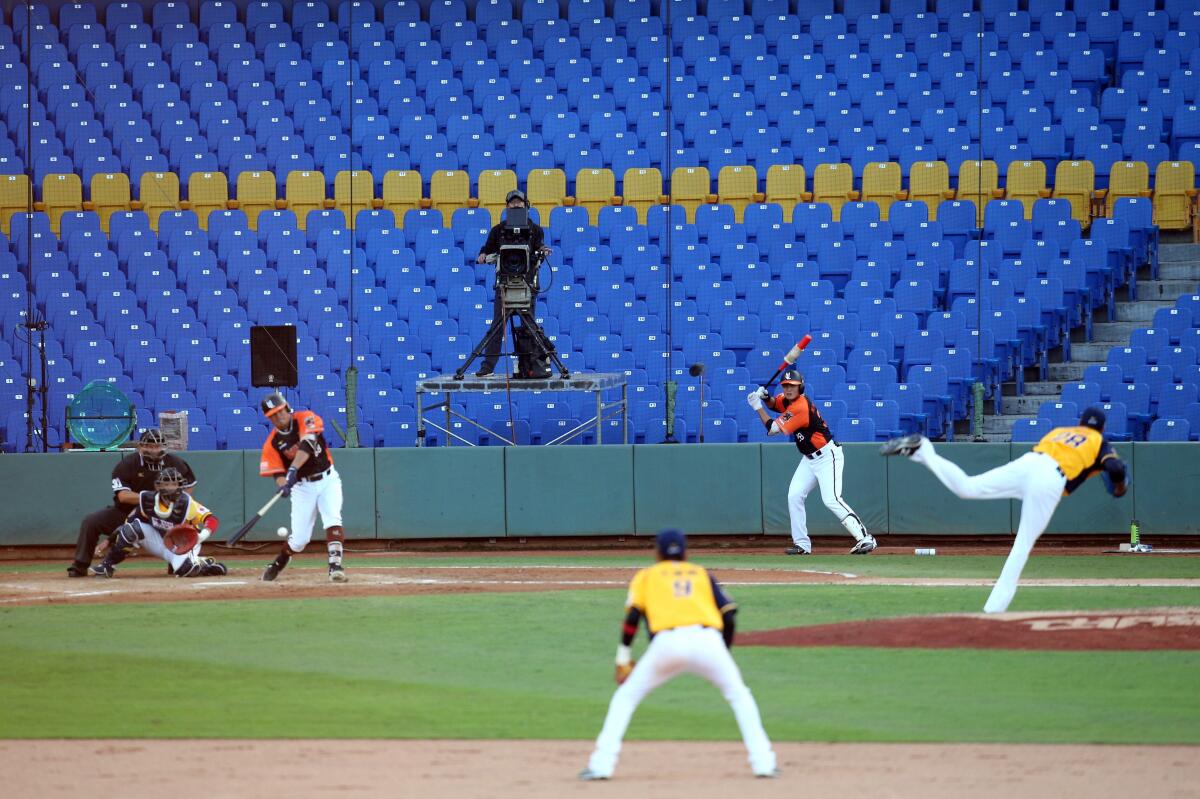
Ariel Miranda threw the first pitch in the first professional baseball game that mattered this year.
He also gave up the first home run — a fastball caught too much of the plate in the second inning — but settled down after the mistake. The former Seattle Mariners left-hander, starting for the Chinese Professional Baseball League’s Chinatrust Brothers in Taiwan, allowed just the one run across five innings Sunday and said he felt great on the mound.
It was everything around him that was wonky.
His team was playing a home game at Taichung Intercontinental Baseball Stadium, but it didn’t seem much like an opening day. The ballpark was empty because the CPBL, the first major professional baseball league in the world to begin its 2020 season, is staging games without fans for the foreseeable future.
“The adrenaline is different,” Miranda said in Spanish during a phone interview. “You feel alone.”
The CPBL is a five-team league in Taiwan, an island state off the coast of China with a population of nearly 24 million. Baseball is the top sport in Taiwan, which has produced more than a dozen Major League Baseball players.
Riverside County reports four new deaths and 144 new cases, including a postal worker
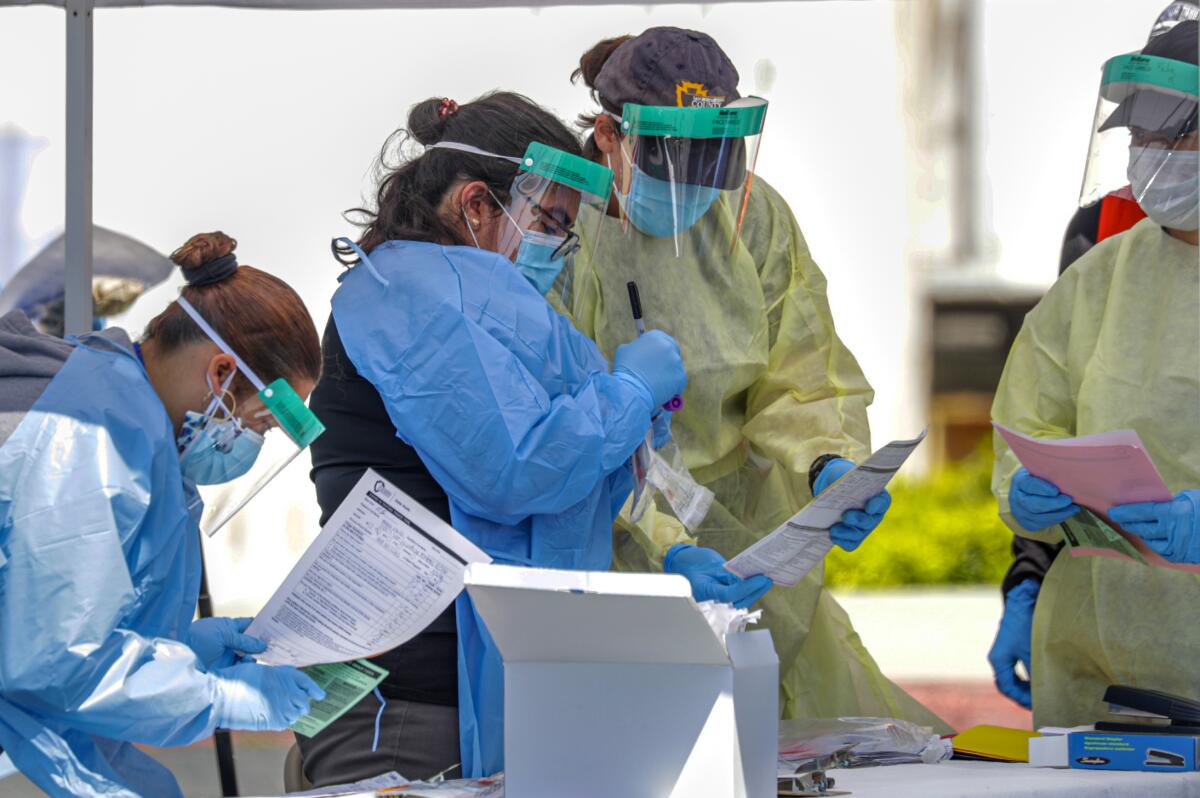
Four additional people died in Riverside County on Wednesday from complications of COVID-19, bringing the county’s total to 54 fatalities, according to health officials.
Brooke Federico, the county’s public information officer, said Thursday that the deceased were from Eastvale, Murrieta, Moreno Valley and Riverside.
There are currently 2,105 confirmed COVID-19 cases in the county, including 144 confirmed Wednesday.
The 23 best web videos about life in quarantine (or to get you through it)

One advantage of the web over what we usually think of as television is that it is quickly responsive to current events and changing tastes. When the world turned sideways this spring, the web had the tools and templates to respond; and TV, when it adapted in turn, looked a lot like the web.
Online media shapes itself to satisfy desires that shape the trends that satisfy the desires it shapes, and so on, even as it accommodates, in highly individual ways, its individual users — who, for that matter, often generate its content. There is something fundamentally, sometimes literally conversational about the web that can serve us well in this time of literal, not necessarily fundamental separation. I mean, it’s a web; we’re all one. (Sitar music plays.)
Here, we round up some of the most striking, funny, comforting or otherwise notable web responses to the coronavirus crisis — as well as a few favorites made before the pandemic began that are worth checking out while you’re staying at home.
Struggling amid the shutdown, L.A. craft breweries reinvent to survive
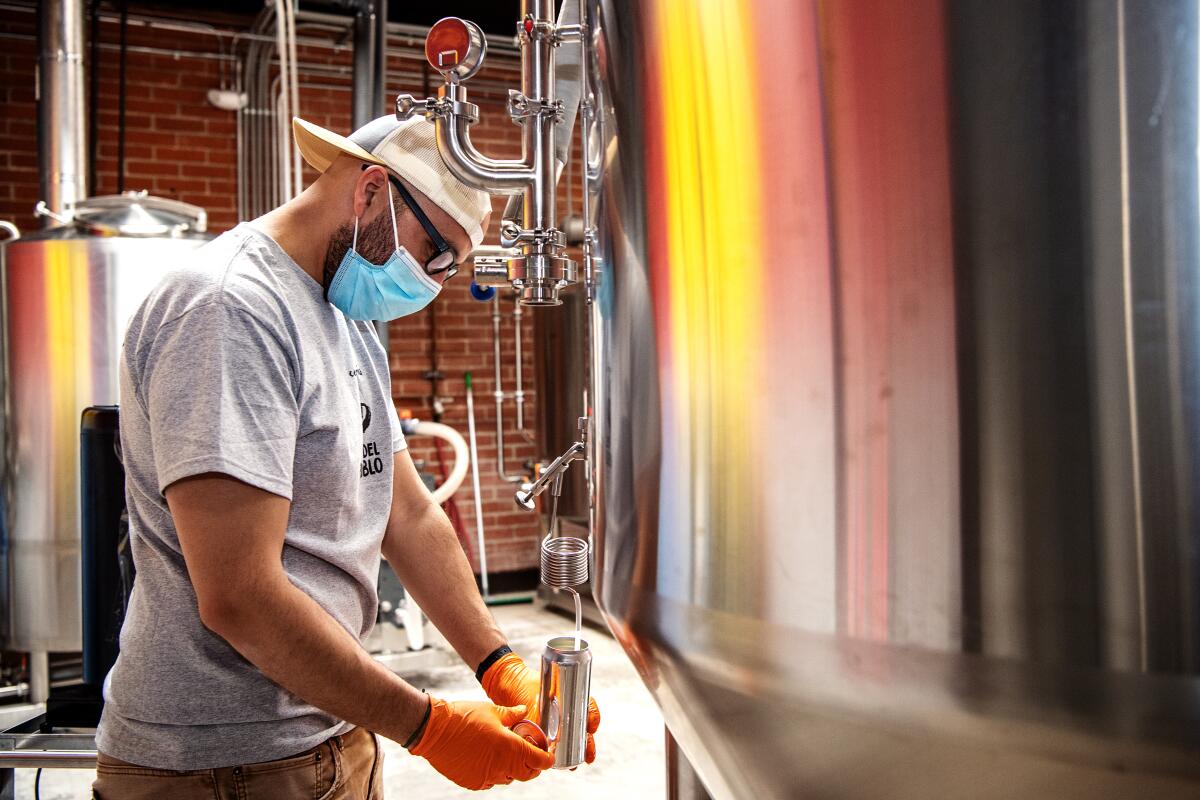
Martin Quinones has spent the last three years building Cervecería Del Pueblo, a small production brewery and taproom in Pasadena.
As the coronavirus pandemic forced the closure of nonessential businesses across the state, Quinones realized that his long-awaited grand opening would have to wait a little longer.
“I was literally ready to open the doors, then this happened,” said Quinones, a motion picture sound editor turned brewer. “It’s painful, for sure.”
Over the last decade or so, the Los Angeles area has been fertile ground for independent breweries, home to a thriving craft beer scene that has seen names such as Eagle Rock Brewery and Beachwood Brewing grow from small, upstart operations into regional powerhouses.
Editorial: The Postal Service is America’s lifeline. Save it
As business skyrockets for Amazon and other online shipping and delivery services during the pandemic, it’s tempting to ask whether it’s time to pull the plug on the U.S. Postal Service, with its every-door, every-day delivery schedule, its bricks-and-mortar neighborhood service centers, its unwieldy pension burden and the enmity of President Trump and much of the GOP establishment. It’s widely projected to become insolvent this year, with drop-dead estimates ranging from June to September, and in any case before October — when vote-by-mail ballots are due to go out in much (and perhaps all) of the nation.
Trump’s dislike of the Postal Service is so intense that he reportedly threatened to veto the recent $2-trillion economic relief package if it included any postal bailout. Private airlines and other giant corporations, yes; the national lifeline that reaches virtually every American in good times and bad, no way.
Yes, the agency is premodern — in a good way.
Op-Ed: Millions of small businesses are about to collapse. We can’t afford the mistakes we made in 2008
The last time America suffered an economic meltdown in 2008 we came out of it poorly.
Yes, the economy and the stock market recovered. So did the banks, with a big assist from Uncle Sam. But millions of homeowners were left with mortgage debts that squeezed their disposable incomes to the vanishing point.
The unshared recovery proved a downer in two ways. First, the recovery was unusually sluggish. Secondly, it gave rise to simmering class resentments. Arguably, it led to the election of Donald Trump.
How can we avoid a similar shock this time?
Roger Lowenstein is the author, most recently, of “America’s Bank: The Epic Struggle to Create the Federal Reserve.”
Glendale residents must wear masks whenever they leave home, exceeding L.A. County order
Glendale residents are now required by law to wear protective face coverings whenever leaving home, exceeding Los Angeles County’s mandate, as city officials attempt to rein in rising cases of the novel coronavirus.
The 4-1 vote by Glendale City Council members on Tuesday brought the city in line with Riverside and San Bernardino counties, which already have the requirement in place. The Centers for Disease Control and Prevention has recommended people cover their faces in public areas where social distancing is hard to maintain.
Last Tuesday, the city ordered those working and shopping in essential businesses, including grocery stores and pharmacies, to cover their nose and mouth with a mask, bandanna or handmade covering. Los Angeles did the same hours earlier. As of Wednesday, that became the requirement for all 88 cities in L.A. County.
Prince Harry and Meghan step into new L.A. life, delivering meals in WeHo
Prince Harry and Meghan Markle are taking the first steps to make the Los Angeles area their home, volunteering this week to deliver meals to vulnerable residents locked down in West Hollywood.
The couple volunteered on Easter Sunday and again on Wednesday to deliver meals via Project Angel Food to people with critical illnesses in West Hollywood, according to ET.
“They told us they heard our drivers were overloaded and wanted to volunteer to lighten the drivers’ workload,” Project Angel Food’s Executive Director Richard Ayoub told the outlet Thursday. Harry and Meghan reportedly adhered to social distancing guidelines and wore masks and gloves.
Senate under pressure to provide more relief money for small businesses
WASHINGTON —The government program designed to help small business weather the economic fallout of the coronavirus pandemic ran out of money Thursday and congressional leaders remained at a standoff over how to replenish the funds.
Over 12 days, the Small Business Administration spent the entire $349 billion that Congress previously authorized to spend on forgivable loans intended to help small businesses maintain their payroll and health coverage for employees.
Republicans want to authorize another $250 billion for the Paycheck Protection Program. But Senate Minority Leader Charles E. Schumer (D-N.Y.) and House Speaker Nancy Pelosi (D-San Francisco) have balked at spending that money without ensuring that microbusinesses and disenfranchized companies are able to participate.
Trump’s WHO funding cut may prevent Africa from being polio-free
The fight to eradicate polio from Africa could become an early casualty of President Donald Trump’s decision to withdraw funding to the World Health Organization, the international body said.
Nigeria, the last polio-endemic country in Africa, hasn’t had a reported case of the virus since August 2016, according to the WHO. The only two other endemic countries in the world are Afghanistan and Pakistan.
The U.S. is a major supporter of the fight against polio, which was on the verge of being eradicated on the continent before the coronavirus emerged, Matshidiso Moeti, WHO regional director for Africa, told reporters Thursday on a video conference call. The U.S. also supports “programs that address diseases such as HIV, malaria and work on strengthening our health systems,” she said.
The global eradication push had already faced setbacks, as WHO suspended polio vaccination campaigns to protect health workers from the coronavirus and free them up to support the fight against the new disease, Director-General Tedros Adhanom Ghebreyesus said on April 3. In Pakistan, which last year reported the biggest surge since 2014, anti-polio campaigns have been targeted by right-wing groups and militants, who’ve attacked health workers.
Some African countries have reported cases of vaccine-derived polioviruses, but only countries with cases of what is called the “wild polio virus” are considered endemic.
The WHO hopes that the decision to withdraw funding “will be rethought because the U.S. government is an important partner, not only in financial terms but also, it’s an important strategic partner,” Moeti said. The organization needs $300 million over the next six months to help African nations respond to the coronavirus alone, Moeti said.
San Diego cancels Pride celebration
San Diego Pride, an annual July tradition that draws as many as 350,000 people over the course of the three-day celebration, will not be held this year in deference to an ongoing statewide prohibition of large gatherings designed to prevent the spread of the coronavirus.
Organizers on Thursday announced the cancellation of the July 17-19 event, a decision that was solidified following Gov. Gavin Newsom’s Tuesday news conference where he made clear that major events attracting large numbers of people are unlikely to occur this summer.
“We have been saying as an organization for about a month now that Pride would not continue unless it’s safe and healthy to do so, but on Tuesday, we received guidance from the governor that for the foreseeable future, mass gatherings of any kind would not be possible,” San Diego Pride Executive Director Fernando López said.
Deaths in Italy continue to plateau with no major decline
ROME — Deaths and new infections in Italy continued to plateau Thursday, showing no significant easing nearly a month after a peak.
The number of deaths of people infected with the coronavirus in Italy grew by 525 in the last 24 hours to 22,170, the smallest increase in four days. At the same time, new cases grew by 3,786 cases to 168,941, the largest jump in four days.
Pressure on hospitals eased with 750 fewer beds occupied, including 143 fewer in intensive care units — with ICU beds dropping below 3,000 for the first time since March 21.
Virologist Andrea Crisanti, who is leading the Veneto region’s efforts to contain the virus, said Thursday that it will be another couple of weeks of strict measures before deaths and infections are expected to drop off significantly.
“We are still seeing the results of what happened four or five weeks ago” in terms of virus circulation, he told foreign journalists.
U.K. extends lockdown for three weeks
U.K. Foreign Secretary Dominic Raab said the government will extend the country’s lockdown by a further three weeks at least in an effort to stem the spread of coronavirus.
Raab, who is standing in for Prime Minister Boris Johnson while he recovers from his own infection with the virus, said the March 23 decision to close most shops and meeting places and limit all but essential travel has worked to slow the spread of the virus.
“Relaxing any of the measures in place would damage both public health and the economy,” Raab said at a televised briefing on Thursday. “We still don’t have the infection rate down as far as we need to.”
The lockdown has been accompanied by unprecedented government support for businesses, with the goal that they should keep staff employed and be able to reopen swiftly. But it risks provoking the largest recession the U.K. has seen in decades: the U.K. economy could shrink by 35%, according to estimates by the Office for Budget Responsibility.
Raab spoke after a further 861 deaths were recorded in U.K. hospitals, bringing the U.K. death toll from the virus to 13,729. The number of confirmed coronavirus cases in the country now exceeds 100,000.
Home-schooling hacks from real parents. (Hint: You need a schedule yesterday)
Schools may be closed, but what’s unfolding in homes across America is the furthest thing from vacation. Despite stay-at-home orders designed to prevent the spread of the coronavirus that causes COVID-19, most school-age children are expected to keep up with their classwork. That leaves their parents, many of whom are working from home now as well, in charge of home-schooling them, or at least making sure that they finish their assignments on time.
We asked parents from across the country about their home-schooling hacks, what it’s been like relearning the algebra they vowed to forget post-graduation and how they are remaining sane during this period of uncertainty. Below is what a dozen of them who are making it work had to say about their new reality.
California plans $125 million in relief to immigrants without legal status. Here are details
SACRAMENTO —Gov. Gavin Newsom has announced a $125-million relief effort due to the coronavirus crisis for immigrants without legal status.
“We feel a deep sense of gratitude for people that are in fear of deportation but are still addressing the essential needs of tens of millions of Californians” in food gathering and other tasks, the governor said.
Here is what we know about the plan:
New York’s MTA to seek $3.9 Billion in federal aid to keep running
New York’s Metropolitan Transportation Authority, the largest mass-transit system in the nation, will ask for an additional $3.9 billion of federal aid as the agency estimates the financial impact of the coronavirus may reach $8.5 billion.
The MTA’s revenue is in a free-fall as people stay at home and avoid using the system. After a nearly $4 billion federal allocation to help combat the virus, the agency needs additional funds to help keep the system running and support the region’s economy, Pat Foye, the MTA’s chairman and chief executive officer, said during a press briefing on Thursday.
“The nation needs a strong New York to lead the recovery in this pandemic,” Foye told reporters.
Facebook will warn users who ‘liked’ hoaxes
Have you “liked” or commented on a Facebook post about the coronavirus pandemic?
Facebook Inc. is about to start letting you know if you’ve spread bad information.
The company will soon be letting users know if they liked, reacted to or commented on posts with harmful misinformation about the coronavirus that was removed by moderators. It will also direct those who engaged with those posts to information about virus myths debunked by the World Health Organization.
Social media are awash in bad takes about the outbreak, and platforms have begun to fight that misinformation.
L.A., other areas planning to reopen some businesses in May, with retail likely going first
SAN FRANCISCO —As California begins to bend the curve on coronavirus cases, some local governments are contemplating how they might gradually reopen various workplaces next month.
In Los Angeles County, the director of the Department of Public Health, Barbara Ferrer, spoke of certain strategies being in place “as we begin to lift our health officer orders, Safer at Home, later on in the month of May, in most likelihood.”
Ferrer said things will be different as businesses reopen: Social distancing will still be important. Retail stores might open in the near future, “but there will be limits on how many people can be in a store at any given time so that people who are there can maintain a lot of distance between themselves,” Ferrer said at a news conference Wednesday.
Britain’s death total reaches nearly 14,000
LONDON — Britain has recorded another 861 coronavirus deaths, bringing the total to 13,729.
The figure released daily by the government underestimates the actual toll because it only includes deaths in hospitals and not nursing homes or other settings.
The increase is 100 more deaths than the 761 reported Wednesday. It’s below the largest daily increase of 980, recorded last week.
The number of deaths each day is starting to fall in Italy, Spain and France, which were hit by the pandemic earlier than Britain.
U.K. health officials say it’s too soon to say whether the outbreak in Britain has reached its peak.
U.S. small-business rescue exhausts cash with many still waiting
The U.S. Small Business Administration said it has stopped accepting applications for a $349-billion federal relief program meant to help small businesses survive the coronavirus outbreak after funding ran out with many still waiting to get a lifeline.
The government-backed loans are available on a first-come, first-served basis, and there’s no remaining funding for the SBA to guarantee additional loans, officials said. Without more money for the program, many small firms that have flooded banks with applications won’t get help.
How to politely ask people to stay six feet away
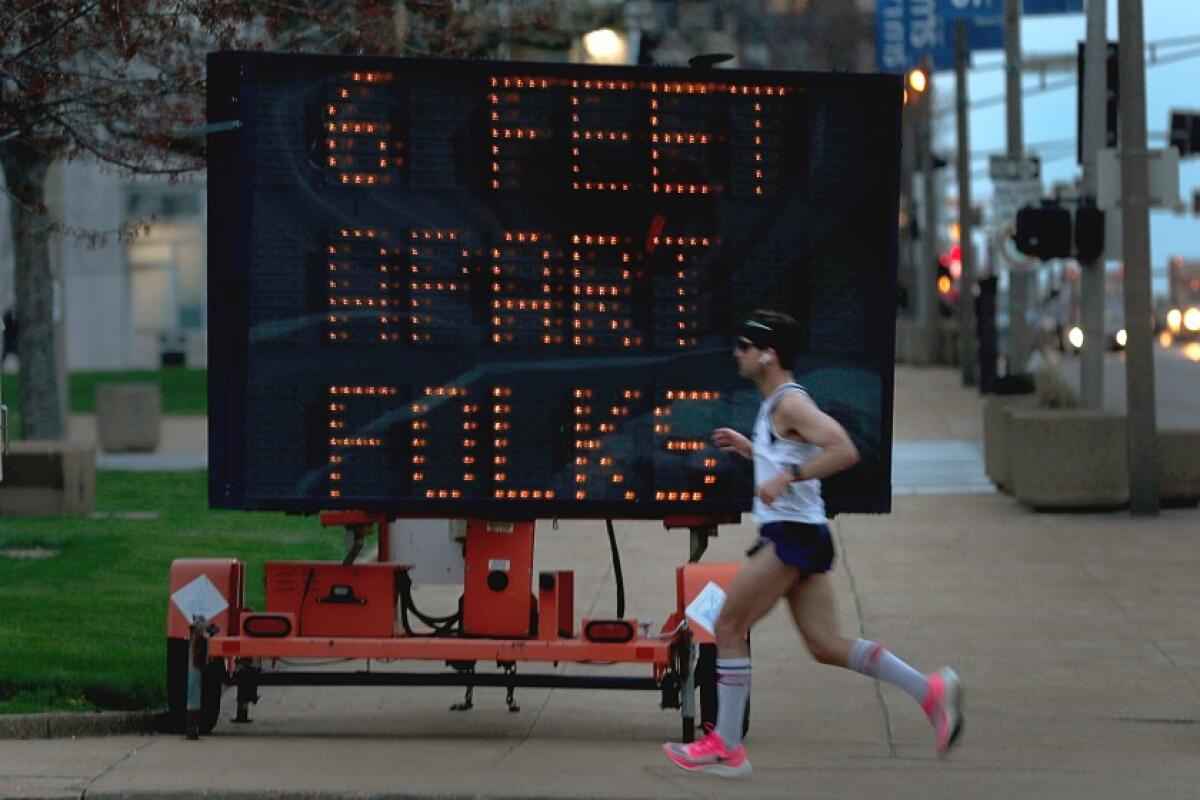
You suited up in your homemade face covering and disposable gloves to buy groceries, but the person behind you in the checkout line is inching closer and closer. Or you’re walking down the street and realize the person coming toward you isn’t altering their path. Now what?
In the age of self-quarantines and social distancing, it’s a whole new world of etiquette. The most gracious, courteous thing you can do for others right now is to stay at home. When you absolutely must go out, though, you may find some people apparently haven’t heard of this whole stand-at-least-six-feet-apart thing.
Experts shared tips for politely asking people to observe social distancing and give you six feet of space:
- Be friendly, pleasant and non-threatening. No one likes to be told what to do; acting like you’re telling someone they’re wrong or bad is more likely to escalate the situation than to resolve it.
- How to say it: “I’m sorry. I’m trying to maintain the six-foot distance. Do you mind giving me a little more space, please?”
- Give people the benefit of the doubt. This is new to all of us and everyone has a lot on their minds. Don’t assume people are doing it to be a jerk — they might have just momentarily forgotten.
- How to say it: “I’m trying to do the whole social-distance thing. Would you mind moving back a little bit?”
- If you don’t feel comfortable asserting boundaries with strangers, borrow authority from someone else.
- How to say it: “Oh, I think we’re supposed to be staying six feet apart, if you wouldn’t mind just backing up a little bit.” “You know, I think the CDC is saying we should stay six feet apart, so let’s keep some distance.”
- Remember that you also usually have the option to be the one to move. Resist the urge to “stand your ground” on the sidewalk, even if you think you should have the right of way. Model good behavior by graciously moving aside. If you’re coming toward someone and they don’t know you’re coming — for instance, if you’re jogging behind someone — you should definitely be the one to move.
In normal, nonpandemic times, fleeing into the street when someone approaches you on the sidewalk might be considered rude. Even now, it probably feels strange. But it’s also the most thoughtful thing you can do for your fellow human beings.
What do you say when the person behind you in line at the grocery store is inching into your six-foot bubble? Experts share the pandemic etiquette.
Ten nurses suspended for refusing care for patients without being given N95 masks
Nurse Mike Gulick was meticulous about not bringing the coronavirus home to his wife and their 2-year-old daughter. He’d stop at a hotel after work just to take a shower. He’d wash his clothes in Lysol disinfectant. They did a tremendous amount of handwashing.
But at Providence St. John’s Health Center in Santa Monica, Gulick and his colleagues worried that caring for infected patients without first being able to don an N95 respirator mask was risky. The N95 mask filters out 95% of all airborne particles, including ones too tiny to be blocked by regular masks. But administrators at his hospital said they weren’t necessary and didn’t provide them, he said.
You can still travel in the U.S. right now. But should you?
Should you travel around the U.S. during the COVID-19 pandemic? The short answer: It’s up to you. Of course, the real answer is more complicated.
The Centers for Disease Control and Prevention usually doesn’t give travel advice and restrictions, but the agency’s website devotes an entire page of questions and factors to consider before you go anywhere. The California Department of Public Health follows those same guidelines.
California breaks grim record: More than 100 deaths reported in one day
Despite promising signs of flattening the curve in the battle against the coronavirus, California continues to see a rising number of deaths linked to the illness.
As of Wednesday night, 889 deaths had been recorded in the state — including 101 new fatalities reported that day. The number marks the largest single-day toll to date.
The number of new cases reported each day has started to show signs the spread of the virus is lessening. So has the number of COVID-19 patients in California’s intensive care units, which has remained between 1,100 and 1,200 people since April 7.
There are more than 27,000 cases across the state, a number that rose by 1,320 on Wednesday.
L.A. County now requires residents to wear face coverings. Here are the details
Los Angeles County’s new requirement on wearing face coverings went into effect Wednesday night. Here’s a look at how that new law works, as well as similar orders around California.
How does L.A. County’s face-covering order work?
Customers of essential businesses are required to wear a face covering while inside.
Also, employers of essential businesses must give all employees — whose duties require contact with other people — a cloth face covering to wear while working with other people.
The sounds of mariachis come to life in Boyle Heights
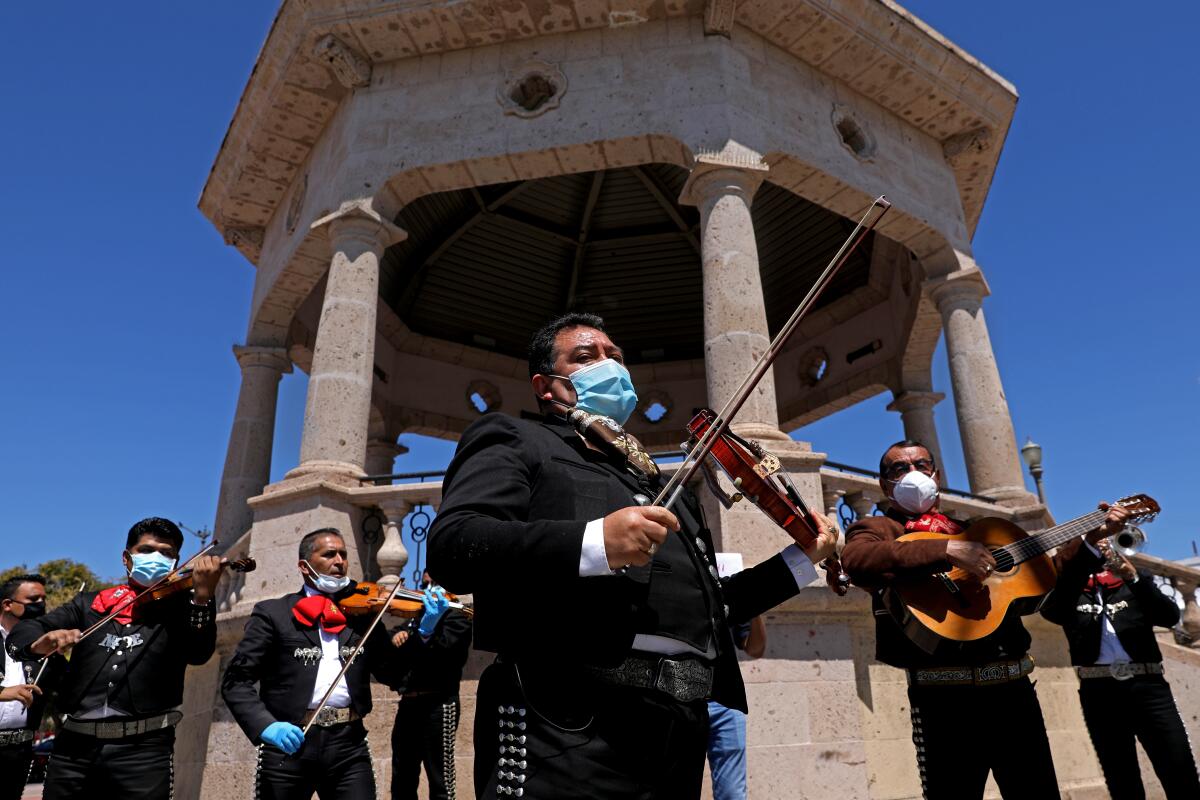
De la Sierra Morena (From the Sierra Morena),
Cielito lindo, vienen bajando (Sweet little heaven, is prancing down),
Un par de ojitos negros (A pair of little black eyes),
Cielito lindo, de contrabando (Sweet little heaven, is sneaking by).
5.2 million more seek unemployment aid
WASHINGTON — The wave of layoffs that has engulfed the U.S. economy since the coronavirus struck forced 5.2 million more people to seek unemployment benefits last week.
Roughly 22 million have sought jobless benefits in the past month — easily the worst stretch of U.S. job losses on record.
All told, nearly 12 million people are now receiving unemployment checks, roughly matching the peak reached in January 2010, shortly after the Great Recession officially ended.
All businesses deemed nonessential have been closed in nearly every state as the economy has virtually shut down. Deep job losses have been inflicted across nearly every industry. Some economists say the unemployment rate could reach as high as 20% in April, which would be the highest rate since the Great Depression of the 1930s. By comparison, unemployment never topped 10% during the Great Recession.
Three sisters set aside a dressmaking rivalry to make masks
For years, the Cerpas sisters engaged in friendly competition. All three ran their own dress shops, the eldest from her home in Corona and the two youngest just a block away from each other in downtown Santa Ana’s 4th Street district.
They sold gowns marking life passages: baptisms, Communions, quinceañeras and weddings. A few years ago, Lilia Cerpas, the middle sister, opted to stand out from the rest and added the word “boutique” to the end of her shop’s name to lure a more affluent clientele.
But in mid-March, business dried up for the sisters as the coronavirus spread to Southern California. Lilia Cerpas, 51, fielded calls from brides who had postponed their weddings. Mothers called off Communions, birthday parties and quinceañeras. She was stuck with the dresses and only half the payment. Her two sisters, Patricia Cerpas, 59, and Vicky Cerpas, 57, also watched their orders and incomes plummet.
How alarming predictions about losses in California gave way to guarded optimism
The dire predictions from Gov. Gavin Newsom and state public health officials have been steady and unnerving: Millions of Californians would be infected by the coronavirus, hospitals would be overrun, desperate patients could die without ventilators.
But a more optimistic outlook is emerging, with several epidemiological studies suggesting the state is probably at the peak number of daily new cases, as long as social distancing restrictions remain in place.
It was less than a month ago, on March 18, that Newsom wrote a letter to President Trump saying that 25.5 million Californians would be infected within eight weeks. And on April 7, Mark Ghaly, California’s secretary of Health and Human Services, said he believed the state would need at least an additional 15,000 ventilators to handle the crisis, which he predicted would peak in May or June.
That toilet paper you bought on Amazon? You may be waiting awhile
The toilet paper promised to be “gently textured” yet “durable enough for the task at hand.” The package’s lettering was in Chinese, save for one word: “Face.”
It wouldn’t come for several weeks, and at $23.90 for 10 rolls, it seemed pricey. But it was available for purchase immediately.
So, on March 20, I did what countless other anxious Americans have done during the coronavirus outbreak: I clicked the “Buy Now” button on Amazon.
It’s been more than three weeks since I placed my order with the seller in Guangzhou, China, and I’m still waiting. A parcel tracking website indicates that China Post has created a logistics order for my toilet paper. Destination: Finland. (I live in L.A.)
Column: With a pledge to follow science, 10 governors made the president blink
On Monday, President Trump in a tweet compared himself to William Bligh, captain of the HMS Bounty, whose sailors tied him up and cut him adrift in the South Pacific in 1789.
Bligh is a favorite bloated villain of pop melodrama, long portrayed as a victim of his own sadism and paranoia. Sometimes even Trump hits the nail on the head.
Earlier that day, governors from the West and East coasts had formed coalitions committed to making public health the first consideration in any plan to restart their economies during the coronavirus outbreak.
China tries to revive the economy, but consumers remain wary
BEIJING — China, where the COVID-19 pandemic started in December, is cautiously trying to get back to business, but it’s not easy when many millions of workers are wary of spending much or even going out.
Factories and shops nationwide shut down starting in late January because of the coronavirus outbreak. Millions of families were told to stay home under unprecedented controls that have been copied by the United States, Europe and India.
The ruling Communist Party says the outbreak, which killed more than 3,340 people among more than 82,341 confirmed cases as of Thursday, is under control in the world’s most populous country. But the damage to Chinese lives and the economy is lingering.
Japan declares nationwide state of emergency
TOKYO — Japanese Prime Minister Shinzo Abe announced a state of emergency for all of Japan on Thursday, expanding a previous order that covered only Tokyo and several other urban areas.
Abe said the measure would take effect Friday and last until May 6, the end of Japan’s Golden Week holidays.
He also announced 100,000-yen ($930) cash handouts to all 120 million Japanese citizens.
Japan has more than 9,000 virus cases and about 150 deaths.
Abe said the new decree was aimed at stopping the cross-border movement of people and achieving as much as 80% of social distancing “to overcome this national crisis in an all-out national effort.”
Smithfield Foods closes plants in Wisconsin and Missouri
CUDAHY, Wis. — Meat-processing company Smithfield Foods will temporarily close its plants in Cudahy, Wis., and Martin City, Mo., because of the COVID-19 pandemic.
The plant near Milwaukee will be closed for two weeks, and the facility in Missouri has been closed indefinitely. The Missouri plant receives raw material from the company’s Sioux Falls, S.D., plant, which is also closed.
Smithfield Foods has reported 518 infections in employees in Sioux Falls and an additional 126 in people connected to them.
Smithfield said a small number of employees at the Wisconsin and Missouri plants have tested positive for the coronavirus.
The company is based in Smithfield, Va., and employs more than 1,000 workers at the Cudahy plant.
In a letter to Smithfield’s human resources department, John Eiden, president of the United Food & Commercial Workers Union Local 1473, raised concerns that the company wasn’t doing enough to protect workers, the Milwaukee Journal Sentinel reported.
Spain records sharp increase in infections and deaths as testing expands
MADRID — Spain is recording another sharp increase of more than 5,183 new reported coronavirus infections and 551 deaths, but authorities say that the rise is due in part to wider testing.
Health Minister Salvador Illa said that at least 1,312, or a quarter of Thursday’s new infections, were identified by the new rapid antibody tests that are also able to identify those who already got over the coronavirus infection or show no symptoms.
Both the contagion and fatality tallies increased about 3% from 24 hours earlier, health ministry data showed. Some 40% of Spain’s 182,816 people infected by the coronavirus have already been released from treatment.
The official death toll rose to 19,130 but is widely believed not to capture the thousands who are reportedly dying with the virus symptoms but are not being confirmed by tests. Spain has not until this week started to extend the tests, which for weeks have been under 20,000 per day.
WHO says it has been ‘overwhelmed by the support of European countries’
GENEVA — The head of the World Health Organization’s European office is hailing a show of support, including some “commitments” from around the world, for the United Nations health agency after President Trump announced a halt to U.S. funding for it.
Amid an increasingly fraught financial situation for the WHO as it battles the coronavirus outbreak, Dr. Hans Kluge said: “We have been overwhelmed by the support of European countries.”
In an online briefing, the WHO’s regional director for Europe credited the United States for its historic support for the agency. The U.S. is WHO’s top donor, contributing $400 million to $500 million annually in recent years. Trump on Tuesday ordered a temporary halt to U.S. funding pending a review of its alleged missteps in managing and responding to the COVID-19 outbreak.
“We are looking at the finance situation. Some commitments have come in,” Kluge said, without elaborating. “But for the time [being], we’re in the midst of the crisis. So what we focus on is to save lives.”
Kluge said some countries such as France, Germany, Italy, Spain and Switzerland have shown “optimistic signs in terms of declining numbers” of coronavirus infections in recent weeks, but the “small positive signals in some countries are tempered by sustained or increased levels of incidents in other countries, including the U.K., Turkey, Ukraine, Belarus and the Russian Federation.”
Japan expects to expand its state of emergency nationwide
TOKYO — Japanese Prime Minister Shinzo Abe is considering expanding an ongoing state of emergency to all of Japan from just Tokyo and other urban areas as the coronavirus continued to spread.
Abe convened a meeting Thursday to get approval from experts — a step he needs to clear before issuing a declaration. An approval is expected later in the day.
In his opening remarks at the experts meeting, Economy Minister Yasutoshi Nishimura said the ongoing partial state of emergency cannot effectively slow the infections because people move in and out of the designated areas.
Abe’s April 7 state of declaration only covers Tokyo and six other prefectures deemed at highest risk. He initially issued a stay-at-home request only to the people in those areas, though later expanded it to the rest of the country.
Additional measures, including nonessential business closures, are in place only in Tokyo and six other prefectures. In Japan, those measures do not carry penalties.
Denmark tells its new citizens: No need to shake our hands
COPENHAGEN — The Danish government says it is immediately suspending the mandatory handshake that newly nationalized Danes are required by law to exchange with official representatives at citizenship ceremonies.
Immigration and integration minister Mathias Tesfaye said Thursday that an upcoming proposal to renew the 2018 law will not make it mandatory for would-be Danes to shake hands, in order to stem the spread of the coronavirus.
The law, presented by the previous center-right government that had a tougher approach to immigration, was widely seen as aimed at some Muslims who for religious reasons decline to touch members of the opposite sex.
“I cannot say when we will give hands to each other again. But we cannot allow thousands of applicants to wait indefinitely to become citizens,” said Tesfaye, a member of the Social Democratic Party. “They meet all other requirements. Therefore, we will pause the rule of handshake. I think that’s common sense.”
Prosecutors are investigating a Bay Area nursing home where 13 have died
Prosecutors in the Bay Area have opened an investigation into a nursing home in Hayward where 13 people have died after contracting the coronavirus.
A spokeswoman for Alameda County Dist. Atty. Nancy O’Malley said Wednesday that her office had begun an investigation into Gateway Care & Rehabilitation Center.
Officials said 41 residents and 26 staff members there have tested positive for the coronavirus. Teresa Drenick, spokeswoman for the district attorney’s office, declined to specify the scope of the investigation but said it began last week.

